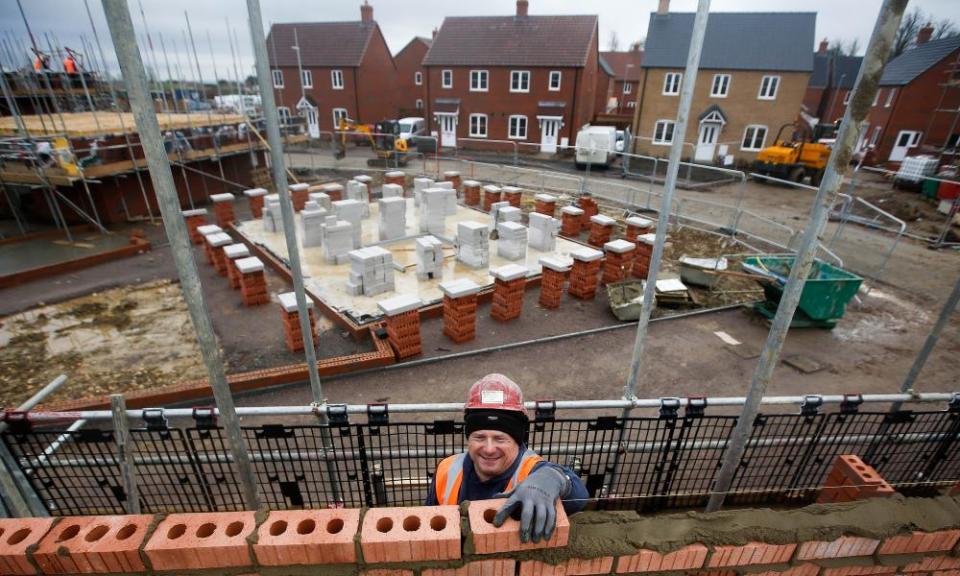Persimmon chair quits over failure to rein in CEO's 'obscene' £100m+ bonus

The chair of housebuilding firm Persimmon has resigned over his role in orchestrating a £100m-plus bonus for the company’s chief executive, as critics accused the firm of benefiting from the taxpayer-backed help-to-buy scheme.
The huge share award worth around £110m was attacked by politicians, charities and corporate governance experts, who described it as “obscene”, “corporate looting” and a reward based on “taxpayer subsidies”. Persimmon is one of the biggest beneficiaries of the government’s help-to-buy programme, which has lifted sales and boosted house prices across the UK.
Nicholas Wrigley, the company’s chair and a former banker, said he regretted not capping the company’s bonus scheme and was leaving “in recognition of this omission”. The scheme, believed to be Britain’s most generous ever bonus payout, will give more than £500m to 150 senior staff, including the award to the chief executive, Jeff Fairburn.
The Guardian understands Wrigley had put pressure on Fairburn to donate some of his bonus to charity, although Persimmon declined to comment.
The payouts, in company shares that can then be cashed in, are linked to the FTSE 100 company’s dividend payments and stock market performance, which has been significantly boosted by the help-to-buy scheme. Under help to buy, the Treasury provides a loan worth 20% of the value of a property, although the buyer must also provide a 5% deposit from their own funds. The programme has provided a significant boost to property developers’ sales since George Osborne introduced it in 2013.
Persimmon’s share price has more than doubled since help to buy launched in April 2013. About half of Persimmon homes sold last year were to help-to-buy recipients, meaning government money helped finance the sales.
Vince Cable, the leader of the Liberal Democrats, told the Guardian that the “scale of this bonus is obscene” and built on a “government subsidy”.
“It is reminiscent of the worst excesses of corporate greed that helped to create the financial crisis, when short-termism was heavily incentivised and long-term planning ignored,” he said.

“This is also a perverse situation where a corporate fortune has been built on what is essentially a government subsidy in help to buy. This situation shows just why help to buy is so flawed: it fuels demand rather than supply, putting house prices even further out of reach of young people, while adding zeros to the bank balances of housebuilding executives.”
Fairburn is due to collect the first £50m worth of bonus shares on 31 December. The scheme, which is based on the level of dividend returned to shareholders, was meant to take 10 years to pay out, but the company has accelerated dividend payments.
This means Fairburn, other executives and more than 100 middle managers are likely to collect all of the bonus shares by July 2018, far ahead of the 2021 schedule. Fairburn’s tranche of shares was worth £128m based on Friday night’s closing share price, but he is likely to take home about £110m once he has paid the option prices on the shares.
John Hunter, the chair of the UK Shareholder Association, which represents small investors, said the bonus scheme was “completely ridiculous” and was based solely on the dividend payments.
“Any bloody fool can pay dividends – it’s just paying them their own money. The scheme is doing the opposite of what it is meant to do – incentivise performance and retention,” Hunter said.
“How does this incentivise people when they’re all sitting on fortunes? If you’re a manager and you’re getting millions you would retire on the spot.”
Hunter said Persimmon had defended the scheme, which was approved by 85% of investors in 2012, as a reflection of the company’s strong performance and the billions of pounds it had returned to investors through dividends.
“It has done brilliantly well – with our money,” he said. “Help to buy has been almost a licence to print money – our money. These bonuses are being subsided by us.”
He added: “I don’t blame directors for putting their hands in an open cookie jar – they are only human. The question here is how this scheme ever got approved.”
Jonathan Davie, Persimmon’s senior independent director and chair of the remuneration committee, which sets company pay, also resigned on Thursday.
“Nicholas and Jonathan recognise that the 2012 LTIP [long-term incentive plan] could have included a cap,” the company said in a statement. “In recognition of this omission, they have therefore tendered their resignations.”
Davie resigned with immediate effect. Wrigley will stay on until his successor has been appointed.
“Since 2012, when the capital return plan strategy was launched and the 2012 LTIP was approved by shareholders, the company has made substantial cash returns to shareholders at the same time as increasing the size of the business and delivering significant shareholder value,” Persimmon said in a statement to the stock market.
“Persimmon has delivered an increase in the number of new homes supplied of over 65%, invested £2.9bn in new land, returned 485p per share (£1.5bn) in cash and increased the proposed capital return by 49% to 925p per share, about £2.85bn.”
Royal London Asset Management (RLAM), one of the company’s shareholders, said Fairburn should volunteer to forego some of the bonus or make a sizeable donation to charity.
“Whilst we hold the remaining senior management team in high regard, we would ask that the CEO and the remaining members of the pay committee acknowledge their errors and correct them,” Ashley Hamilton Claxton, RLAM’s head of responsible investment, said. “One of the options the CEO could consider would be taking a voluntary reduction, or donating some of the money.”
Garry White, the chief investment commentator at the stockbroker Charles Stanley, said: “The size of these bonuses means management could easily be accused of corporate looting, so shareholders have every right to be unimpressed.”

 Yahoo Finance
Yahoo Finance 